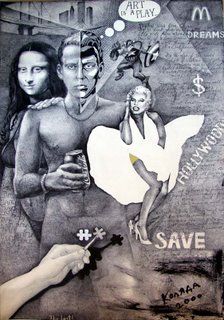We were in a small cafe
You could hear the guitars play

Serhiy Kolyada
Three by Carl Rakosi:
Poet Carl Rakosi, the last living Objectivist, died in 2004 at the age of 100. The historical-minded may know of Objectivism as a loose-knit 1930s literary project (not to be confused with Ayn Rand’s cult of the same name) whose core members were George Oppen, Rakosi, Louis Zukofsky and Charles Reznikoff. Roughly speaking, they were, and saw themselves, as second-generation Modernists. Rakosi’s work both pre- and post-dates Objectivism, due both to his temperament and longevity. Retracing his path one encounters many twists and turns, notably a quasi-biblical element – The Missing Years; he famously stopped writing for 30 years, returning to poetry after he received a letter from an admirer, English academic Andrew Crozier. Based in San Francisco since around 1970, Rakosi wrote, published and read in public up to the last year of his life. -- Klipschutz
MAN AT WORK
Every other man
runs a business.
Every fourth man
is professional.
A table
not with four legs
but with statistical legs.
This is that strangest
of all worlds, numbers,
which no one can enter
as a whole man
nor leave behind
for it is the principle
of the mind at work,
its style, its strict
proportions
its alignment
its very faculty
that timeless order
which is bilk to poets,
wholly without heart or humor,
immaterial as fairy,
yet the very frame of industry
the grub of scholars
the final sawdust
of the absolute.
THE IRISH BOY
I don’t know what’s got into that rooster.
First, he appointed himself the morning herald,
now he’s out there on the roof proclaiming
to one and all that every hen within sight
belong to him. . .his, his, his. . .
and that he intends to go down to the hen house
and lay them all, none will be spared,
and if anybody wants to take exception to this,
let him come forward and he will personally
take them all on, one by one or in the aggregate;
otherwise, let the sleepers hold their peace.
THE CLASSICS
The girls
wear rings
on the water
silver beaten
with a punch
the carved end
striking out
two flowers.
This day
the young
men, sternum
in the water,
swim below
the cutter races.
Women used to
pass into the
public buildings
with a blue jug
on their heads
and stand
like statues
with the noses
knocked off,
commemorating
the signing
of the peace.
You could hear the guitars play

Serhiy Kolyada
Three by Carl Rakosi:
Poet Carl Rakosi, the last living Objectivist, died in 2004 at the age of 100. The historical-minded may know of Objectivism as a loose-knit 1930s literary project (not to be confused with Ayn Rand’s cult of the same name) whose core members were George Oppen, Rakosi, Louis Zukofsky and Charles Reznikoff. Roughly speaking, they were, and saw themselves, as second-generation Modernists. Rakosi’s work both pre- and post-dates Objectivism, due both to his temperament and longevity. Retracing his path one encounters many twists and turns, notably a quasi-biblical element – The Missing Years; he famously stopped writing for 30 years, returning to poetry after he received a letter from an admirer, English academic Andrew Crozier. Based in San Francisco since around 1970, Rakosi wrote, published and read in public up to the last year of his life. -- Klipschutz
MAN AT WORK
Every other man
runs a business.
Every fourth man
is professional.
A table
not with four legs
but with statistical legs.
This is that strangest
of all worlds, numbers,
which no one can enter
as a whole man
nor leave behind
for it is the principle
of the mind at work,
its style, its strict
proportions
its alignment
its very faculty
that timeless order
which is bilk to poets,
wholly without heart or humor,
immaterial as fairy,
yet the very frame of industry
the grub of scholars
the final sawdust
of the absolute.
THE IRISH BOY
I don’t know what’s got into that rooster.
First, he appointed himself the morning herald,
now he’s out there on the roof proclaiming
to one and all that every hen within sight
belong to him. . .his, his, his. . .
and that he intends to go down to the hen house
and lay them all, none will be spared,
and if anybody wants to take exception to this,
let him come forward and he will personally
take them all on, one by one or in the aggregate;
otherwise, let the sleepers hold their peace.
THE CLASSICS
The girls
wear rings
on the water
silver beaten
with a punch
the carved end
striking out
two flowers.
This day
the young
men, sternum
in the water,
swim below
the cutter races.
Women used to
pass into the
public buildings
with a blue jug
on their heads
and stand
like statues
with the noses
knocked off,
commemorating
the signing
of the peace.

0 Comments:
Post a Comment
Subscribe to Post Comments [Atom]
<< Home